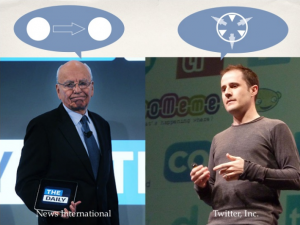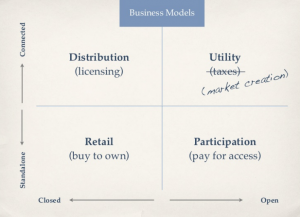BBC offered another history of London documentary the other night, a sort of people’s perspective on how the character of the city has changed over time, obviously inspired by Danny Boyle’s Opening Ceremony at the Olympics.
Some of the sequences were interesting to me particularly as a foreigner – the gentrification of Islington, the anarchist squatters in Camden, the urbanization of the Docklands, etc. Â – a running theme of haves vs have-nots.
It’s one of a collection of things inspiring me recently including a book called ‘The Return of the Public‘ by Dan Hind, a sort of extension to the Dewey v Lippman debates, what’s going on with n0tice, such as Sarah Hartley’s adaptation for it called Protest Near You and the dispatch-o-rama hack, and, of course, the Olympics.
I’m becoming reinvigorated and more bullish on where collective action can take us.
At a more macro level these things remind me of the need to challenge the many human constructs and institutions that are reflections of the natural desire to claim things and own them.
Why is it so difficult to embrace a more ‘share and share alike’ attitude? Â This is as true for children and their toys as it is for governments and their policies.
The bigger concern for me, of course, is the future of the Internet and how media and journalism thrive and evolve there.
Despite attempts by its founders to shape the Internet so it can’t be owned and controlled, there are many who have tried to change that both intentionally and unwittingly, occasionally with considerable success.
How does this happen?
We’re all complicit. Â We buy a domain. We then own it and build a web site on it. That “property” then becomes a thing we use to make money. Â We fight to get people there and sell them things when they arrive. Â It’s the Internet-as-retailer or Internet-as-distributor view of the world.
That’s how business on the Internet works…or is it?
While many have made that model work for them, it’s my belief that the property model is never going to be as important or meaningful or possibly as lucrative as the platform or service model over time. More specifically, I’m talking about generative media networks.
Here are a few different ways of visualizing this shift in perspective (more):
Even if it works commercially, the property model is always going to be in conflict with the Internet-as-public-utility view of the world.
Much like Britain’s privately owned public spaces issue, many worry that the Internet-as-public-utility will be ruined or, worse, taken from us over time by commercial and government interests.
Playing a zero sum game like that turns everyone and everything into a threat. Â Companies can be very effective at fighting and defending their interests even if the people within those companies mean well.
I’m an optimist in this regard. Â There may be a pendulum that swings between “own” and “share”, and there are always going to be fights to secure public spaces. Â But you can’t put the Internet genie back in the bottle. Â And even if you could it would appear somewhere else in another form just as quickly…in some ways it already has.
The smart money, in my mind, is where many interests are joined up regardless of their individual goals, embracing the existence of each other in order to benefit from each other’s successes.
The answer is about cooperation, co-dependency, mutualisation, openness, etc.
We think about this a lot at the Guardian. I recently wrote about how it applies to the recent Twitter issues here. And this presentation by Chris Thorpe below from back in 2009 on how to apply it to the news business is wonderful:
Of course, Alan Rusbridger’s description of a mutualised newspaper in this video is still one of the strongest visions I’ve heard for a collaborative approach to media.
The possibility of collective action at such an incredible scale is what makes the Internet so great. Â If we can focus on making collective activities more fruitful for everyone then our problems will become less about haves and have-nots and more about ensuring that everyone participates.
That won’t be an easy thing to tackle, but it would be a great problem to have.


